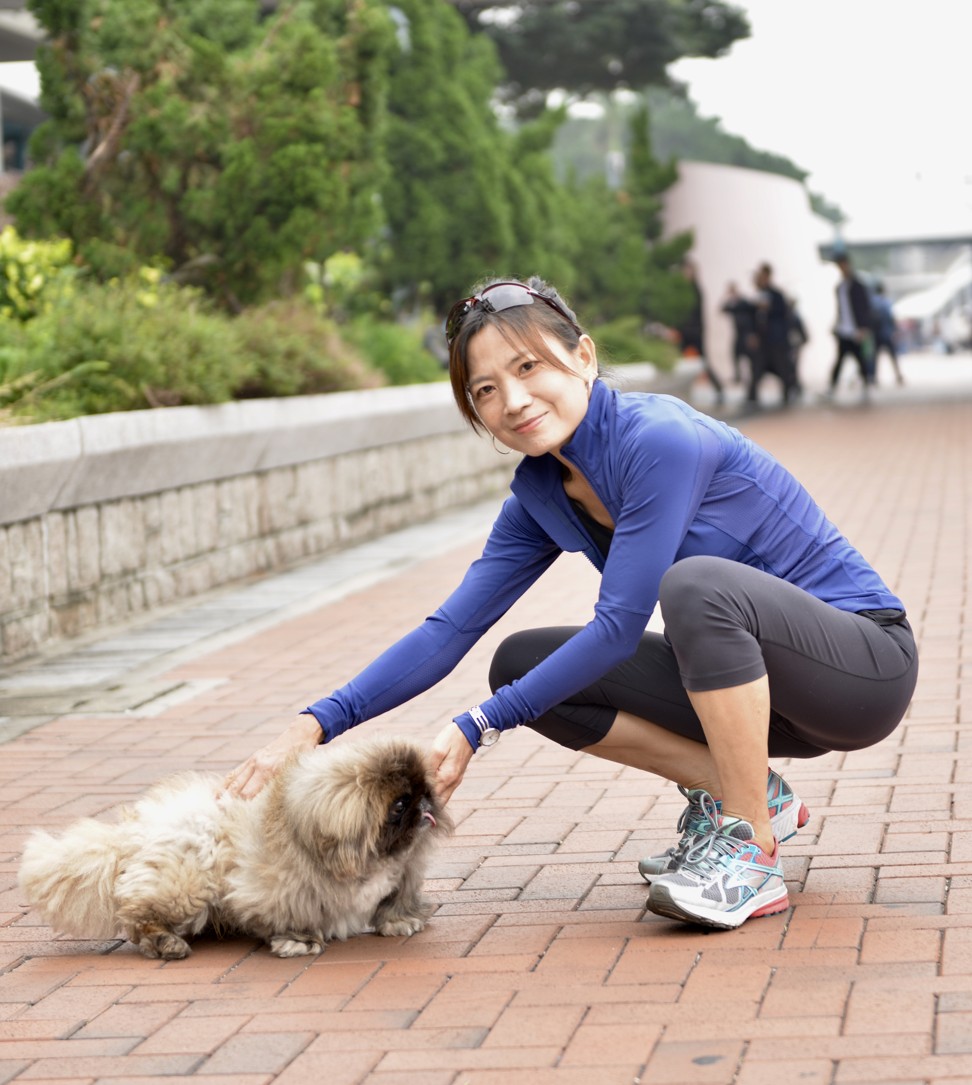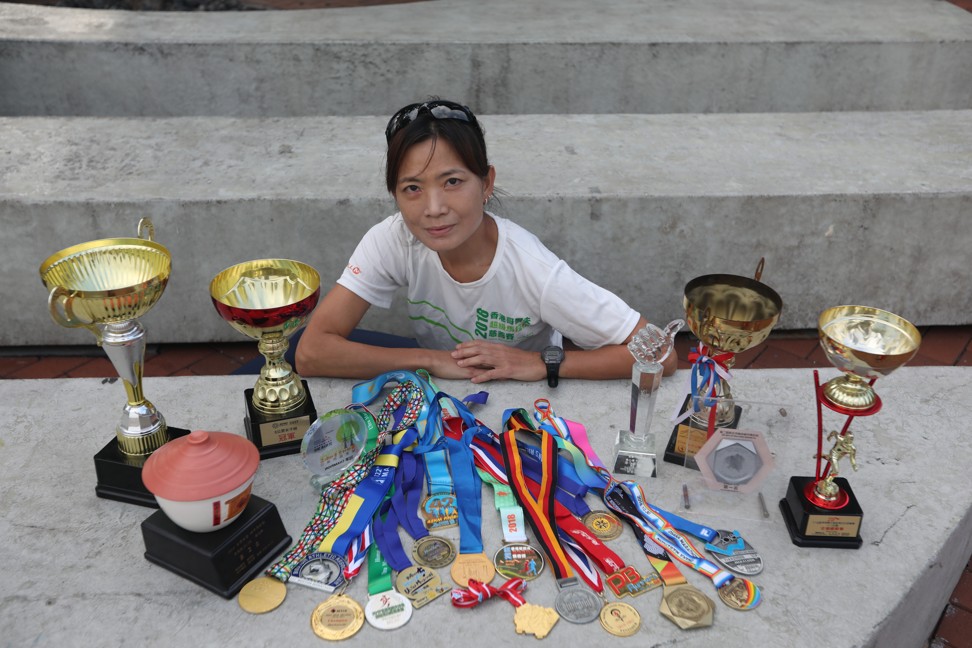
How yoga and a vegetarian alkaline diet can help you run faster and further, and cheer you up
- Ultrarunner Janet Shum believes running can lift you out of a mental funk
- Breathing exercises and a meat-free diet have helped her push beyond her limits
An easy way to shift gears physically and mentally, Janet Shum believes, is to go for a run. That’s why this ultrarunner nudges friends and relatives who are feeling low to get out and join her on a fun run.
“After running, you feel more happy because you are more energised,” Shum says.
A casual jogger for decades, she started getting serious about marathons seven years ago when she signed up for her first full marathon, Hong Kong’s Standard Chartered Marathon, in 2012. The original plan was to help get her nephew out of a mental funk.
“He was a bit depressed and not sure what he was going to do, so I said I’ll join you in the marathon and encouraged him to be more positive,” she recalls.
She crossed the 42km finishing line in four hours and 12 minutes, kick-starting her love of distance running. While the nephew threw in the towel last year, Shum progressed toultra-endurance races.

She ran as a navigator in the Run for Vision, Round the Island event, a charity relay run for the visually impaired and the disabled. “When you’re disabled, you’re [sometimes] depressed and don’t want to socialise with people, but with running you will find yourself thinking: ‘Oh, I can run even if I’m impaired or disabled,’” she says.
Shum encourages unhappy friends to run, too, though she admits it can be difficult to coax them out of their homes to hit the road and get their hearts pumping.
‘I have muscles’: runner uses web to challenge Chinese beauty norms
“It’s only when you are half motivated and not sure if somebody wants to go with you, that is when the person might give it a go,” she says, adding it’s the best chance to drag people out onto the streets to run.
On the horizon is the Hong Kong Ultra Marathon Charity Race at the Hong Kong Golf Club in Fanling on January 26 and 27, with proceeds going to the Hong Kong Single Parents Association.
The third edition of the event will take place at the club’s old course in Fanling where there will be a range of competitions. The ultra-endurance part of the race on the 26th includes six-, 12- and 24-hour runs. Participants see how many kilometres they can clock within those limits.
On the 27th, there will be fun runs, shorter distance competitions for corporate teams and families, plus a 1.2km “Doggy Happy Together Race” for people and their canines.
Shum hasn’t yet decided whether to take part in the 12- or 24-hour race. Last year, she ran 57km in the six-hour event, for a fourth-place finish overall and first place in the 50-plus age group.
Hong Kong mother who runs marathons for fun – 64 in 30 years
To maintain her racing shape, Shum trains with a running club twice a week that includes tempo runs for cardio exercise.
On weekends she embarks on three- to four-hour endurance runs. Like many ultrarunners, she packs competitions into her schedule in the run-up to a major race, such as the Round the Island races.
Shum is convinced yoga improves her performance too. She practises four or five times a week, and believes deep breathing helps generate a more alkaline body state, an insight gained from Canadian Ironman Brendan Brazier’s book Thrive: the Vegan Nutrition Guide to Optimal Performance in Sports and in Life.

Shum has adopted a predominantly vegetarian lifestyle for two decades, but will eat seafood during family outings as a way to neutralise tension over her dietary choices.
Brazier’s book claims the more veggies one consumes, the more balanced one’s blood pH level, and that yoga contributes to this state from the deep breathing that oxygenates one’s system. Both conditions contribute to raising energy levels. In contrast, a meat eater’s diet generates a more acidic state, resulting in fatigue, agitation, sleep challenges and more.
Shum is convinced these practices helped her win a Taiwan marathon in Wulai, a forested landscape where she claims the negative-ion-rich greenery boosted her performance.
She had never broken the ribbon at a marathon finish line before that. “I’m not very young but all the young girls were behind me,” she recalls on her shock win in a time of 04:01:11:42.
Vegan bodybuilder and trainer talks about his diet, shares recipes
She says runners tend to hit “the wall” by the 35km mark, when energy stalls and performance declines. But at that point in the Taiwan marathon, Shum felt alert as she focused on deeply inhaling the pristine air. “It keeps you highly charged with energy – oxygen, air, the power of nature, all helps the runner, in addition to a vegetarian diet,” she explains.
Recently, Shum competed for the first time in the 100km Hong Kong Oxfam Trailwalker. She trained for six months prior with the Trailwalker Teaching Room, and marvelled at how she could walk non-stop for 11 to 12 hours a day, without rest.
She considered 24 hours a good target time for the event – the cut-off is 48 hours. But her nerves heightened weeks before the race when she was assigned to KK Chan’s team. He is a highly reputed elite runner (and TTR’s chief trainer). “Their target was to [complete the race] in no less than 16 hours so I had a lot of anxiety but decided to let go and try my best,” she recalls.

Shum credits yoga in aiding her performance in this race. At one stage she felt ready to quit, but told herself to concentrate on breathing to relax and stay in the moment.
To her amazement, her team did finish in 16 hours. That shifted her perspective as she finally understood why top runnerscontinue to push their limits to explore their potential.
Shum subscribes to vegan ultrarunning legend Scott Jurek’s philosophy. He believes that when we push ourselves beyond the comfort zone, we find strength we didn’t know we had.
“You can do something extraordinary and better understand yourself,” Shum says.
Boost your creative thinking by stepping out of your comfort zone
She draws inspiration from her pet, too. Recently, her seven-year-old Pekinese suffered a spinal problem that left it immobile. After surgery, though, Ball Ball recovered to his old, highly active self. That episode was a lesson to treasure one’s mobility, as one day it could be gone. “For a dog or human being, it’s the same,” she says.
Whenever she struggles with exhaustion in a race or while training, she draws motivation from that experience, grateful that she is still healthy and able to participate in her beloved sport.
“Whenever you can run, [then] run … as you don’t know what will happen tomorrow.”

